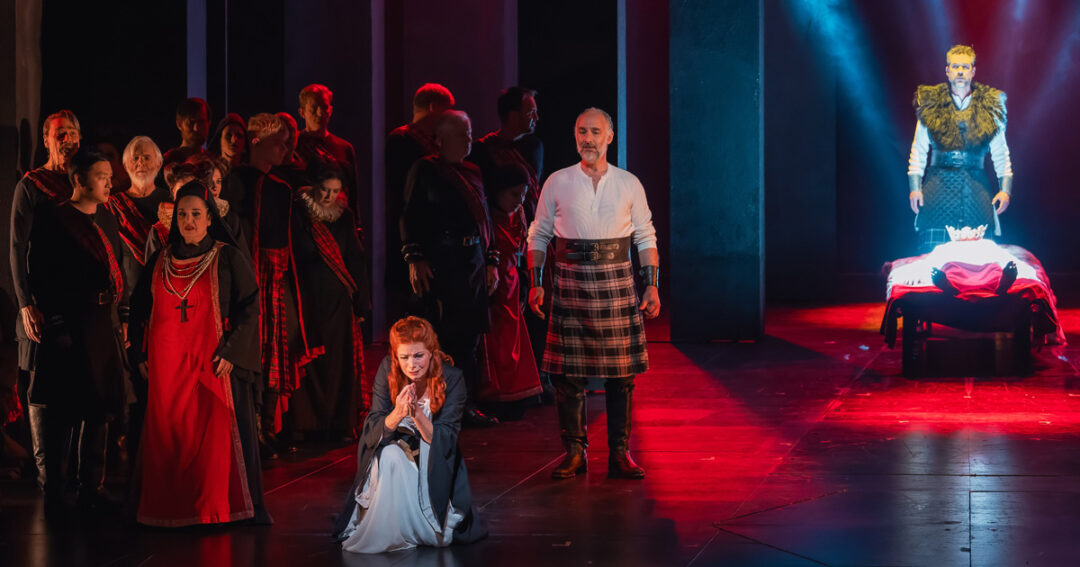In Macbeth, Shakespeare has his protagonist claim, that life “is a tale told by an idiot, full of sound and fury, signifying nothing.”
In State Opera’s Macbeth, we have a grand opera that has been composed by a genius, a production full of sound, light, and fury, and a story that shows how even amid the nothingness of everything, nothing can thwart the resounding, glorious triumph of high art.
There is much to say about the music and the singing but in the beginning there was light.
Trudy Dalgleish (Lighting Designer) and Roger Kirk (Set & Costume Design) have drawn deep from the secret potions of their professions to concoct the most breathtaking and mercurial environment, most befitting for a grand opera. Their enlightened use of perspective, grainy textures, smoke, and a “moveable forest” of ceiling high columns, create a mesmerising array of places and moods. Highlights include the Rembrandtesque vignette when news of Duncan’s death is announced (all muted reds and sepia tones), the intense focus of brilliant white light on Duncan’s body on a stage deeply engulfed in bloody red, and the menacing, claustrophobic use of columns and shadows to foretell the imminent ending of this tragic tale.
The Adelaide Symphony Orchestra, conducted by Finnegan Downie Dear, transformed Verdi’s composition from a grand score into a soaring, poised, cinematic experience of immeasurable dynamic range. Yes, there was fury, but often there was delicate, intense, unhurried quietness, as these musicians painted the aural elements into place.
Chorus Master, Anthony Hunt, also conjured exquisite darkness from his cauldron of skills and experience to produce siren-like sounds and power from his chorus of witches. I have no words to describe how transfixing their performances were, how powerfully they cast a spell upon all gathered at Her Majesty’s on opening night. There was no second fiddle here for this chorus on this night. Bravo to all 36 souls who sang to the heavens from the depths of hell.
Director, Stuart Maunder, has much to be proud of, from his cast of principals. I will let critics more studied in the nuances of operatic performance detail their particular and technical achievements, save a mention for José Carbó, whose Macbeth conveyed the Dostoevsky-ian torment and double thinking demanded of his role, pacing his performance with the wisdom borne of his great experience on the stage. Equally, Kate Ladner’s evil and possessed Lady Macbeth, brought forth the cold and calculating manner of the grand mastermind of death the Bard had created. And amid all the other performances, one patron turned to me after Paul O’Neill’s Macduff returns and exclaims his grief, saying “he just stole the show”.
This production is masterful and one sure to enthral even inexperienced opera goers, such is its pace, clarity, and luscious music. Furthermore, the themes of blind, selfish greed giving rise to violence and deceit is as timeless today as it ever has been. For example, we have all experienced the excesses of malevolence in our lives from time to time. Verdi’s reimagining of Shakespeare’s tale into a deft play of corruption and wickedness, stands the test of time and is (sadly) as relevant today as it has ever been.
State Opera’s Macbeth is a walking, singing shadow, that struts and frets its hours upon the stage and soon will be heard no more. Do not miss it.

